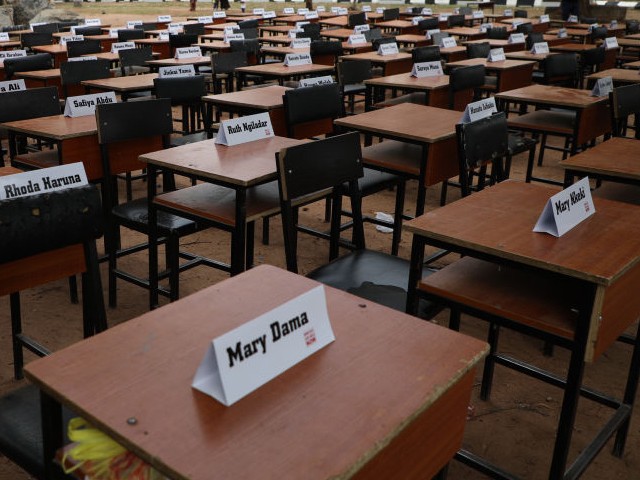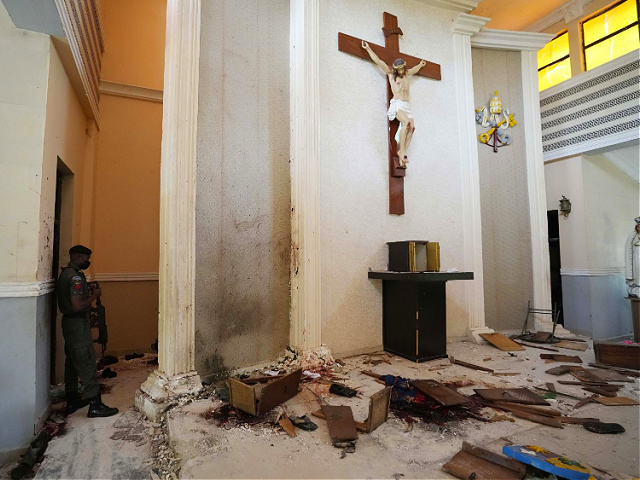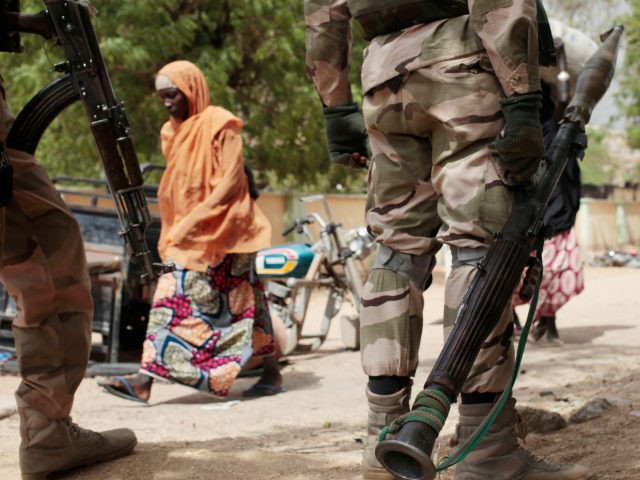Nigeria’s Boko Haram jihadis are once more accused of kidnapping dozens of women in northeastern Nigeria. Like its allies in the Islamic State, Boko Haram has a history of using captive women, including very young girls, as sex slaves and forcing them to “marry” its fighters.
The victims of the latest attack were women living in the Babba Sansani refugee camp, located near the town of Gamboru Ngala in the state of Borno. Previous Boko Haram attacks had forced the refugees to leave their homes.
U.N. Resident and Humanitarian Coordinator Mohamed Malick Fall said that a group of more than 200 women, boys, and girls was collecting firewood near the camp when “members of a non-state armed group allegedly abducted” them.
“While an unspecified number of older women and children under 10 have reportedly been released, scores of IDPs [internally displaced persons] remain unaccounted for,” Fall said.
“I stand in solidarity with the families of all those abducted, especially children, and their communities and urge those who have abducted them to release them without harm,” he added.
Fall also criticized Nigerian authorities and other concerned parties in the region for not providing enough “livelihood opportunities” for the refugees, forcing them to put themselves in danger by foraging outside protected areas.
“Those who venture beyond the protective trenches surrounding these towns to forage or farm do so at great peril, with killings, abductions, forced recruitment and sexual and gender-based violence (GBV) rampant,” he noted.
Fall warned that women whom terrorist gangs kidnap are frequently subjected to sexual abuse, while boys are “targeted for recruitment.”
“It was on Sunday that we got information that over 200 displaced people went to get firewood but unfortunately Boko Haram kidnapped them, allowing only the very young and very old to return,” a resident told the BBC on Wednesday.
One of three women who managed to elude the kidnappers said gunmen ambushed and surrounded the victims, forcing them to march through the bush and across the border into Chad.
Various reports have estimated the number of victims kidnapped and not subsequently released back to the refugee camp is between 50 and 300. CBS News on Wednesday quoted local media reports that refugees from several other camps were seized at the same time.
Boko Haram’s most infamous atrocity, the mass kidnapping of young girls from a school in the Borno town of Chibok in 2014, involved more than 270 victims.

Names of the remaining Chibok schoolgirls are displayed on their desks on April 14, 2019, during the fifth year commemoration of the abduction of the 276 Chibok schoolgirls by Boko Haram on April 14, 2014, from Government Secondary School, Chibok, Borno State, Nigeria. (KOLA SULAIMON/AFP via Getty Images)
The BBC noted the abductions occurred “several days ago,” but the news is only just reaching the outside world because Gamboru Ngala is a “remote area, on the shores of Lake Chad, where the jihadists have destroyed mobile phone masts and other telecommunication infrastructure.”
Borno state officials told the BBC they had dispatched a “response team” to the site of the kidnappings and shut down the road leading to Gamboru Ngala.
A local militia leader more specifically blamed the abductions on the branch of Boko Haram that renamed itself the Islamic State – West Africa Province (ISWAP).
Boko Haram has been active in Nigeria since 2009; the ISWAP alleged schism occurred in 2015, reportedly because some Boko Haram fighters did not agree with their leadership swearing fealty to ISIS “caliph” Abu Bakr al-Baghdadi. Baghdadi was killed in a U.S. special forces operation that former President Donald Trump ordered in October 2019.
Nigeria has an unfortunate history of declaring Boko Haram to be utterly defeated, only for the jihadis to resurface and commit fresh atrocities. In recent years, the Nigerian government has treated ISWAP as an entirely different group and blamed it for the worst horrors, such as the massacre of 40 Catholics at a church in southern Nigeria in June 2022.

A police officer stands guard inside the St. Francis Catholic Church after an attack that targeted worshipers in Owo, Nigeria, on June 6, 2022. (AP Photo/Sunday Alamba)
Boko Haram and ISWAP have killed at least 35,000 people since 2009, and more than two million people in Borno state have been displaced from their homes.

COMMENTS
Please let us know if you're having issues with commenting.